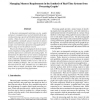Free Online Productivity Tools
i2Speak
i2Symbol
i2OCR
iTex2Img
iWeb2Print
iWeb2Shot
i2Type
iPdf2Split
iPdf2Merge
i2Bopomofo
i2Arabic
i2Style
i2Image
i2PDF
iLatex2Rtf
Sci2ools
146
click to vote
RTAS
1998
IEEE
1998
IEEE
Managing Memory Requirements in the Synthesis of Real-Time Systems from Processing Graphs
In the past, environmental restrictions on size, weight, and power consumption have severely limited both the processing and storage capacity of embedded signal processing systems. Today, however, as increases in processor speed and capabilities continually out-pace increases in memory densities and performance, processor capacity is no longer a major concern for many signal processing applications -memory usage is now the primary concern. We present techniques for managing the memory requirements of signal processing applications in the synthesis of a real-time uniprocessor system from processing graphs. To demonstrate the effectiveness of our memory management techniques, we compare the memory requirements of a statically scheduled implementation of an INMARSAT (International Maritime Satellite) mobile receiver, with our dynamic scheduling techniques. The case study demonstrates that state-of-the-art, static schedulers use over 300% more memory than our simple, preemptive, EDF sched...
Embedded Systems | Memory Requirements | RTAS 1998 | Signal Processing | Signal Processing Applications |
Related Content
| Added | 05 Aug 2010 |
| Updated | 05 Aug 2010 |
| Type | Conference |
| Year | 1998 |
| Where | RTAS |
| Authors | Steve Goddard, Kevin Jeffay |
Comments (0)

